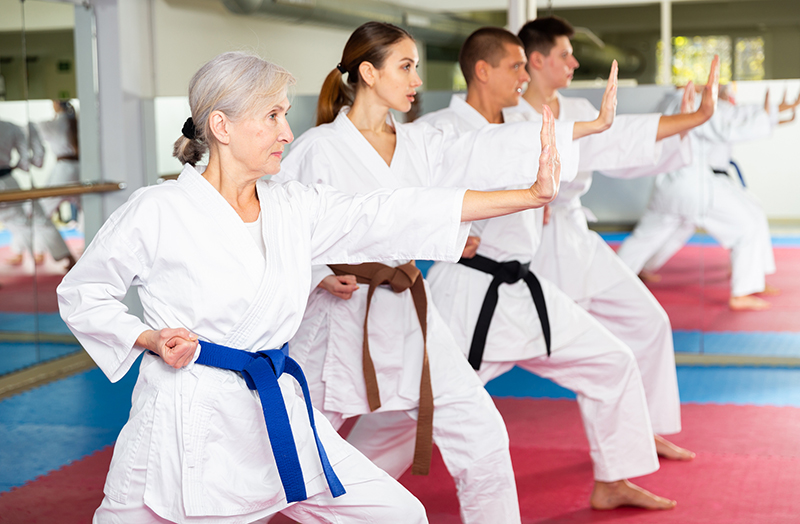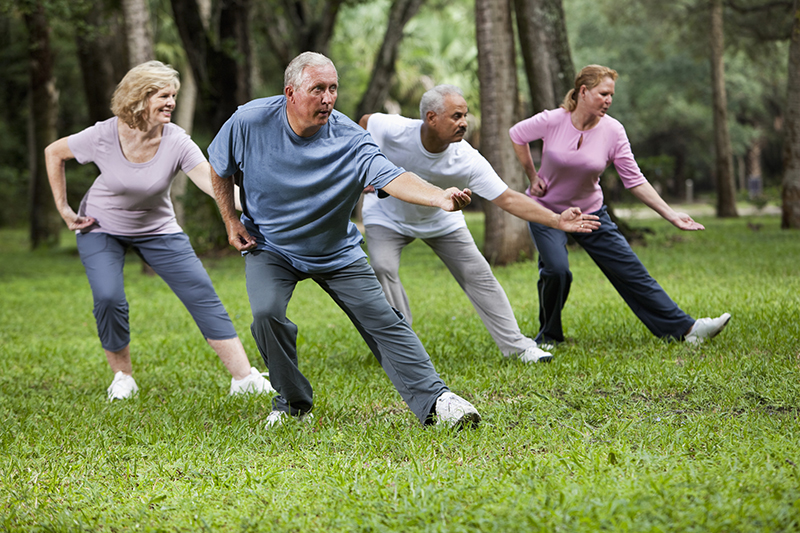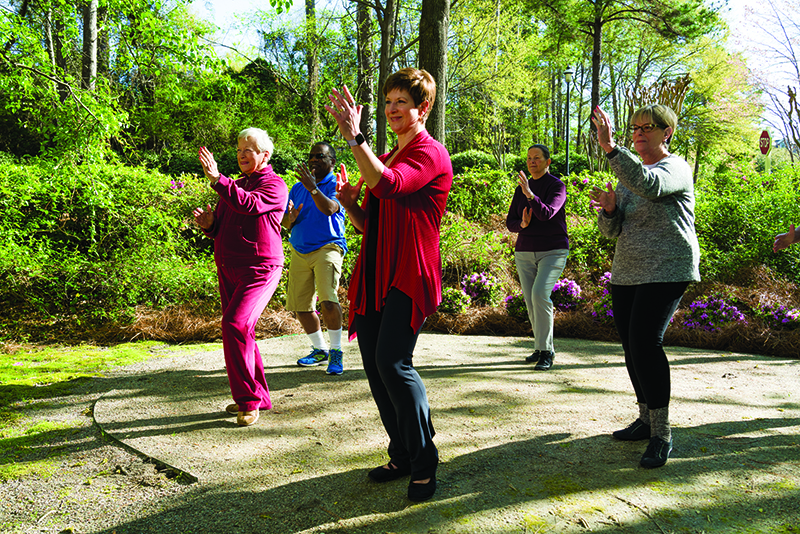A Quick Guide to Martial Arts for Seniors
Retirement is a chapter filled with possibilities, and staying active is key to enjoying every moment. If you’re seeking a fun and engaging way to boost your health, challenge yourself, and connect with others, martial arts for seniors might be the perfect fit.
Read on to explore age-appropriate styles, delve into the many health benefits, and get practical tips for embarking on your martial arts journey.
Forms of Martial Arts for Older Adults
The world of martial arts offers a diverse range of disciplines, each with its own unique philosophy and techniques. For seniors, certain types of martial arts stand out for their adaptability and focus on overall well-being:
Tai Chi
Often referred to as “meditation in motion,” tai chi is a graceful martial art that emphasizes slow, flowing movements, deep breathing, and mental focus. It’s a low-impact exercise that’s gentle on the joints, making it an excellent choice for seniors who may be seeking a less strenuous form of physical activity.
The practice of tai chi offers a myriad of benefits, including improved balance, increased flexibility, reduced stress, and enhanced overall coordination.
Its meditative aspects can also promote mental clarity and relaxation, contributing to a greater sense of well-being. Tai chi is often practiced in a group setting, fostering a sense of community and camaraderie among participants.
Aikido
This elegant Japanese martial art is a beautiful blend of physical technique and philosophical principles. Unlike many other styles, Aikido focuses on redirecting an attacker’s energy rather than meeting force with force.
This makes it an ideal choice for individuals who may not have the same physical strength or speed they once did but still want to learn effective self-defense techniques. Aikido movements are fluid and circular, emphasizing joint locks, throws, and pins.
Regular practice can significantly improve joint flexibility, muscle strength, and overall coordination. The emphasis on mental focus and calmness during training can also have a positive impact on stress levels and mental well-being.
Wing Chun
This style of Kung Fu is renowned for its practicality and efficiency. It emphasizes close-quarters combat, utilizing quick, direct strikes and simultaneous blocking and attacking movements.
Wing Chun’s unique “sticky hands” drills develop sensitivity and reflexes, allowing practitioners to anticipate and respond to their opponent’s movements.
What makes Wing Chun particularly appealing for older people is its focus on technique and leverage rather than brute strength. This means individuals of all fitness levels can effectively learn and practice Wing Chun, gaining valuable self-defense skills and improving their overall coordination and agility.
Discover a Holistic Approach to Wellness
As we explored in the previous section, martial arts offer a myriad of physical and mental health benefits for seniors, extending far beyond physical fitness. While we touched on some of these advantages, let’s dig deeper into the holistic approach to wellness that martial arts provide:
Increased Self-Esteem
Martial arts training is more than physical fitness; it’s a journey of self-discovery and empowerment. As you progress through the ranks, mastering new techniques and overcoming challenges, your self-esteem naturally grows. This newfound confidence extends beyond the dojo, positively impacting your everyday life.
Improved Cardiovascular Health
Engaging in martial arts is like giving your heart a revitalizing workout. The dynamic movements involved in various styles, such as kicks, punches, blocks, and footwork drills, elevate your heart rate and get your blood pumping.
This increased cardiovascular activity strengthens your heart muscle, improves blood circulation throughout your body, and enhances the efficiency of your cardiovascular system.
Stronger Bones
Movements like kicks, punches, and stances in martial arts require your bones to support your body weight, sometimes even with added impact. This weight-bearing activity stimulates bone growth and strengthens the existing bone structure.
Martial arts engage multiple muscle groups and promote full-body movement. This can help strengthen the entire skeletal system, including the spine and hips.
Sharpen Mental Acuity
Martial arts require intense focus and concentration to execute techniques correctly and respond to your opponent’s movements. This constant engagement of your attention can improve your ability to concentrate on tasks in daily life.
Learning and remembering complex movement patterns and combinations challenge your memory and recall abilities. This mental exercise can help keep your memory sharp and reduce the risk of age-related cognitive decline.

Before You Get Started, Prioritize Safety First
It’s natural to have concerns about safety when considering martial arts, especially as an older adult. However, with the right approach and guidance, martial arts can be a safe and enjoyable activity for seniors.
Here are some key points to keep in mind:
Open Communication
It’s crucial to communicate openly with your instructor about any existing health conditions or physical limitations you may have. They can then tailor exercises and techniques to your individual needs, ensuring a safe and effective practice.
Modifications for Comfort
Martial arts are incredibly adaptable. Instructors can modify movements, reduce intensity, or offer alternative exercises to accommodate various fitness levels and abilities. There’s no need to push yourself beyond your comfort zone.
Focus on Technique
Proper technique is paramount in martial arts. By prioritizing correct form over speed or power, you can minimize the risk of injury and ensure a safe training experience.
Warm Up and Cool Down
Always warm up before each session to prepare your muscles and joints for activity. Similarly, cooling down afterward helps prevent stiffness and soreness.
By following these safety guidelines and working with a qualified instructor, you can enjoy the many benefits of martial arts with confidence. Remember, safety is a collaborative effort between you and your instructor.
Five Tips To Get Started
Ready to embark on your martial arts adventure? Here are some practical tips to help you get started:
- Invest in Proper Gear: Your instructor can recommend the appropriate attire and protective gear for your chosen martial art. Wearing the right gear can help prevent injuries and ensure a comfortable training experience.
- Set Realistic Goals: Define what you want to achieve through martial arts. Whether it’s improving your balance, building strength, or simply having fun, setting goals will help you stay motivated and track your progress.
- Be Patient and Persistent: Learning martial arts takes time and dedication. Don’t get discouraged if you don’t master techniques immediately. Celebrate small victories and enjoy the journey.
- Listen to Your Body: Pay attention to how your body feels during and after your martial arts class. Don’t push yourself too hard, and make sure to take breaks when needed. Rest is an essential part of the learning process.
- Have Fun! Martial arts should be an enjoyable experience. Embrace the challenge, make new friends, and discover the joy of lifelong learning.

Let Your Retirement Journey Unfold at Brandon Wilde
We know that age is no match for your adventurous spirit! Whether it’s mastering a new skill, pursuing a lifelong passion, or simply trying something different, our community offers endless opportunities to embrace your curiosity and expand your horizons. From engaging Tai Chi classes to a variety of other activities, there’s always something new to discover.
Contact us today to learn more and schedule a personalized visit and explore a world of possibilities at Brandon Wilde, where every day is an adventure waiting to unfold.


